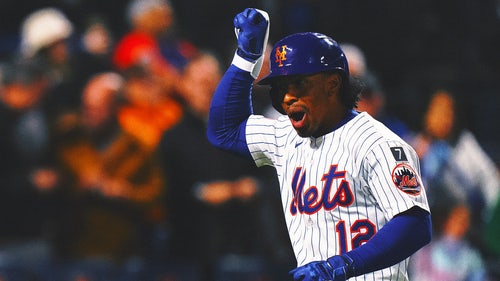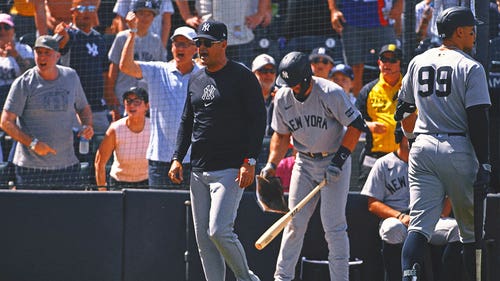
You still can't count out the Rockies
In his 29th and final season as a manager, Atlanta's Bobby Cox sat in the visiting dugout of Coors Field, preparing for what would be his final game at the mile-high elevation and spoke prophetically about the adventures at altitude.
``It’s a great ballpark, great city, and good people,’’ Cox said. ``But it is a different ballgame here. ... Even when you are down five runs in the fifth, you never have the feeling you are out of it.’’
In his Colorado farewell, Cox and his NL East-leading Braves were given one last reminder.
The Rockies, who have made late-season rallies into the postseason in two of the last three years, gave not only the Braves, but the NL wild-card frontrunners in Philadelphia, San Francisco and St. Louis, a warning that as poorly as the Rockies have played this season, there are 36 games left on their regular-season schedule and they aren’t giving up yet.
A team that woke up Sunday morning just two games above .500, and seven games back in the wild-card race may not be totally well, but it is still alive in the NL postseason battle. Oh, the Rockies do have plenty of challenges ahead of them, such as having to jump over three teams in the wild-card race, and still having to play 16 games on the road, where they are an embarrassing 25-40 this season and 7-17 since the All-Star break.
But what may seem impossible to most is merely improbable for the Rockies.
In 2007, they won 14 of their final 15 regular-season games en route to their first World Series.
In 2009, they were an ugly 12 games below .500 a week after firing manager Clint Hurdle, and wound up claiming the NL wild card.
And that brings them to 2010, where they have struggled to find consistency, have seen the six highest-paid players on their roster struggle through disappointing seasons, including outfielder Brad Hawpe, whose $7.5 million salary ranked third on the Opening Day roster. He was granted his release when it became clear that the Rockies weren’t going to exercise their $10 million option on 2011 and were going to give Seth Smith the bulk of the playing time in right field in the finals days of 2010.
On top of that:
• Todd Helton, the team’s highest-paid player at $16.6 million, is hitting .260 with four home runs and 24 RBI, but has hit .317 since coming off the disabled list in early August;
• Aaron Cook, No. 2 at $9 million, is currently on a minor-league rehab assignment but was only 4-8 with a 5.34 ERA in 21 starts before going on the disabled list;
• Huston Street, No. 4 at $7.2 million, spent the first three months on the disabled list and is 2-4 with 12 saves in 16 opportunities and a 4.15 ERA since being activated;
• Jeff Francis, No. 5 at $5.75 million, is 4-4 with a 4.56 ERA in 16 starts, having spent the first six weeks on the disabled list, and then returning to the DL on Aug. 14;
• and Jorge De La Rosa, No. 6 at $5.75 million, is 5-4 with a 5.54 ERA in 13 starts, having spent 77 games on the disabled list with a torn tendon sheath in the middle finger of his left hand.
``Any season is about challenges, and how you deal with them,’’ said Helton.
And the Rockies haven’t given up on this season, at least not yet. Nothing underscores that more than the way the Rockies bid Cox adieu on Wednesday afternoon.
With starting pitcher Esmil Rogers knocked out in the second inning, and reliever Manuel Corpas forced out in the third because of an elbow problem that has him destined for the disabled list, the Rockies were in a 10-1 hole, and manager Jim Tracy was talking to pitching coach Bob Apodaca about the position player most suited to pitching an inning or two so the bullpen wouldn’t be blown out.
``And then,’’ said Tracy, ``here we go ...’’
By the time the game was over, the Rockies had a 12-10 victory, equaling the biggest comeback in franchise history.
``It would have been easy to fold it up,’’ admitted first baseman Helton, ``but we wound up with an unbelievable win.’’
And Cox? He wound up swept in his final visit to Colorado, facing a team against which he enjoyed more success (.617 winning percentage) than any other in the NL, but in a ballpark that proved to be an unsolvable challenge. Sure, Cox and the Braves are 43-34 all-time in Colorado, but Cox was 31-33 in his regular-season career at Coors Field after winning 12 of 13 games at Mile High Stadium in the Rockies' first two years of existence.
All of that leads to the debate of whether the Rockies have enough left to conjure up another unbelievable season-ending surge.
They are going to need help. They do have three teams in front of them in the NL wild-card race. But ...
Philadelphia did stumble at home this week, and got swept in a four-game series with Houston, and has scored two or fewer runs in seven of its last eight games, all of which were played in the bandbox they call home, leaving the Phillies a half-game behind San Francisco in the wild-card race. The Rockies have one game left with Philadelphia — at Coors Field on Sept. 2, when both teams fly in from the West Coast for a makeup game.
San Francisco has stumbled to eight losses in the last 16 games, and three of those wins came in a four-game series against the hapless Chicago Cubs. The Rockies have six games left with the Giants, including a three-game series that begins on Monday at AT&T Park, and they have won seven of their last 10 games against the Giants, including three of four in San Francisco.
And St. Louis, sitting a game back in the wild-card race after sweeping a three-game NL Central showdown with Cincinnati, arrived in Washington on Thursday night having lost eight of its last 12 games, including two of three against both the Cubs and Pittsburgh Pirates. The Rockies finish out the regular season with a four-game series in St. Louis.
``The opportunity is there,’’ said Helton. ``It is up to us to take advantage of it.’’
So far, that’s been easier said than done.
The Rockies do, after all, have 16 of their final 36 regular-season games on the road, and there is no team in baseball that has a bigger home-road differential than the Rockies, particularly since the All-Star break. While enjoying a 38-20 home record that ranks second best in baseball to only Atlanta, the Rockies are 24-40 on the road, having lost 17 of 24 road games since the break.
Consider that in rallying from that 10-1, third-inning deficit to a 12-10 victory on Wednesday, the Rockies rallied for four more runs (11) in six innings against the Braves then they scored combined in a 2-4 road trip in which their only victories were 3-2 in 10 innings at Los Angeles on Aug. 18, and 1-0 at Arizona on Sunday.
There are, however, those 16 remaining road games that linger, and include a trip next week that takes them to both San Francisco and San Diego for three games apiece, with that quick trip home for that one-game makeup against the Phillies.
The road has been rocky for Colorado, which leads the majors with a .300 average at home, but ranks 30th with a .228 average on the road. The Rockies' 5.9 runs per game average at Coors Field is 2.3 runs higher than what they have averaged on the road.
``There’s nothing more to be said about that,’’ said Tracy. ``We have discussed and dissected the (road differential) every way possible. We just need to take care of business on the field.’’





